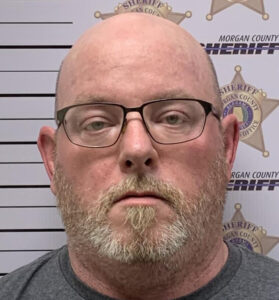Rogers sentenced to life without parole, mother speaks
By David Gambino For the Enquirer
Prosecutors, defense attorneys and the mother of convicted capital murderer Frederic Rogers shared their reactions Wednesday after a Morgan County jury sentenced Rogers to life in prison without parole.
“The jury did its job,” said lead defense attorney J. Brent Burney. “There was really no right or wrong answer. You’ve got families of victims from that house that are hurting and continue to hurt. So, it’s just tough. There’s no highfiving.” Rogers, 26, shot and killed four people at a drug house on Talucah Road on June 4, 2020, while his alleged accomplice, John Legg, 23, is accused of killing three others. The seven dead were Jeramy Roberts, 31, of Athens; James Wayne Benford, 22, of Decatur; William Zane Hodgin, 18, of Somerville; Roger Lee Jones Jr., 20, of Decatur; and Tammy England Muzzey, 45; Emily Brooke Payne, 21; and Dakota Green, 17, all of Valhermoso Springs.
Legg’s trial date has not yet been set.
Rogers’ case was tried before presiding Circuit Judge Stephen Brown. In addition to Burney, Rogers was represented by Carl Cole and Christy Miller. Chief Assistant District Attorney Garrick Vickery and Assistant District Attorney Courtney Schellack prosecuted the case.
At the start of the case, which began last month, Rogers’ attorneys conceded that he would be found guilty. He had confessed twice to the murders following his arrest, and Cole told the jury, during openings, that Rogers “will die in prison.” The jury found Rogers guilty of capital murder on Aug. 28.
The defense team’s strategy focused on saving Rogers from the death penalty. During the penalty phase, which lasted more than a week, they attempted to paint a picture of Rogers’ entire life, which included a troubled childhood, mental illness and drug abuse.
The prosecution proved two capital aggravators during the guilt phase – murder during a burglary and murder of two or more people – and attempted to prove a third aggravator in the sentencing phase: that the murders were especially heinous, atrocious or cruel compared to other capital cases.
The jury began deliberating on Rogers’ punishment Tuesday afternoon and returned a verdict Wednesday morning. They unanimously found that the State proved the third aggravator. Ten out of 12 jurors voted to sentence Rogers to life in prison without parole.
As Brown read the sentence, Rogers’ mother, Tasha Thompson, released an audible gasp of relief. Across the courtroom, on the other side of the gallery, families and friends of the victims made no sound.
Miller appeared emotional after the sentence was read. Rogers pulled three tissues from a box on the defense table and passed them to her.
Brown sentenced Rogers in accordance with the jury’s findings, and Rogers will remain in the Morgan County Jail without bond until he is transferred to the custody of the Alabama Department of Corrections.
As people slowly trickled out of the courtroom, one woman who had sat in the gallery near the prosecution said to Rogers: “Enjoy your life in prison.” Thompson heard the remark, jumped out of her seat, and walked after the woman, who had, by then, exited the courtroom. Thompson stopped at the entrance the courtroom, peered out for a few moments, and returned to her seat.
Reactions “My condolences and my heart goes out to those families, and I wish that this never happened,” Thompson said later in front of the courthouse. “And I know my son wishes he could take it back, but he can’t.” Thompson called Rogers “a great kid,” said the day was “bittersweet,” and lamented that she’ll never get another birthday or holiday with her son.
“I wasn’t always there,” she said. “You know, I was a teenage mom. I was 17 when I had him. The abandonment issues that he felt from me – I was unaware of until all this happened. I do blame myself for how his life went, you know, because I was a single mom with boyfriends here and there until I met my husband.” Thompson said she feels like Rogers got involved with the wrong crowd and “it just went sideways for him.” Since the murders, she said he has since “given his life over to Christ.” Vickery, accompanied by Schellack, also spoke in front of the courthouse. He said his reaction was tough to process so soon after sentencing.
“I think the jury did their job, I think they went about their job well, even if we disagree with the verdict,” he said. “I think this case was tried fairly by both sides, the defense and the prosecution. I think they (the jury) looked at everything they needed to look at. They are sort of the conscience of the community. And this is what their decision is, and we will respect it.” Vickery said he thinks the length of mitigation and the penalty phase – over a week – played a factor in the jury’s decision. He said the DA’s Office anticipates trying Legg’s case early next year, and it will be “a completely different trial” from Rogers’. He also thanked the “group effort” of law enforcement agencies: the Morgan County Sheriff ‘s Office, Madison County Sheriff ‘s Office, FBI, etc.
Burney said his initial reaction to the sentence was “shock and sadness,” as there are “no winners” on either side. In his closing statement yesterday, he compared the trajectory of Rogers’ life with his daughter’s – the two were born 40 days apart at Huntsville Hospital. His daughter is now an attorney.
“It is personal,” he said. “The State of Alabama wanted to kill him. Execute him.” Cole said Burney’s daughter was the flower girl at his wedding.
“I got emotional listening to him talk about that, because family matters, and who you’re born into matters,” he said. “In a different family, Ricky (Frederic) Rogers isn’t sitting over there. And that’s what Brent drove home. It was personal. And I thought he did a great job, and I’m proud of him.” Cole likened his opening statement at the start of the guilt phase, wherein he conceded Rogers’ guilt, to a “Hail Mary.” “You hear about this case at the beginning, and you hear seven dead bodies and the nature of it, and there’s a lot of people that thought there’s no chance: this is an automatic death penalty case,” he said.
“I thought acknowledging on the front end that he could be kept away from society for the rest of his life, that if any jurors had a fear of him ever committing another crime, they didn’t have to live with that fear. I didn’t like doing it, but it’s the thing I felt like best served the client. And I’m going to get some grief over it, but it was the right tact.” Burney agreed and said research shows putting up a dishonest defense almost guarantees a death penalty. He said being up front with the jury about Rogers’ guilt from day one helped their credibility with jurors.
Burney and Cole praised the diligence of the jury and thanked Miller, along with their investigator, mitigation team and forensic experts.
“This was touted as the worst murder case, the biggest murder case, in Morgan County,” said Burney. “And out of a jury of 12 people, 10 just said give him life. And it started with Carl’s opening, without a doubt.”






